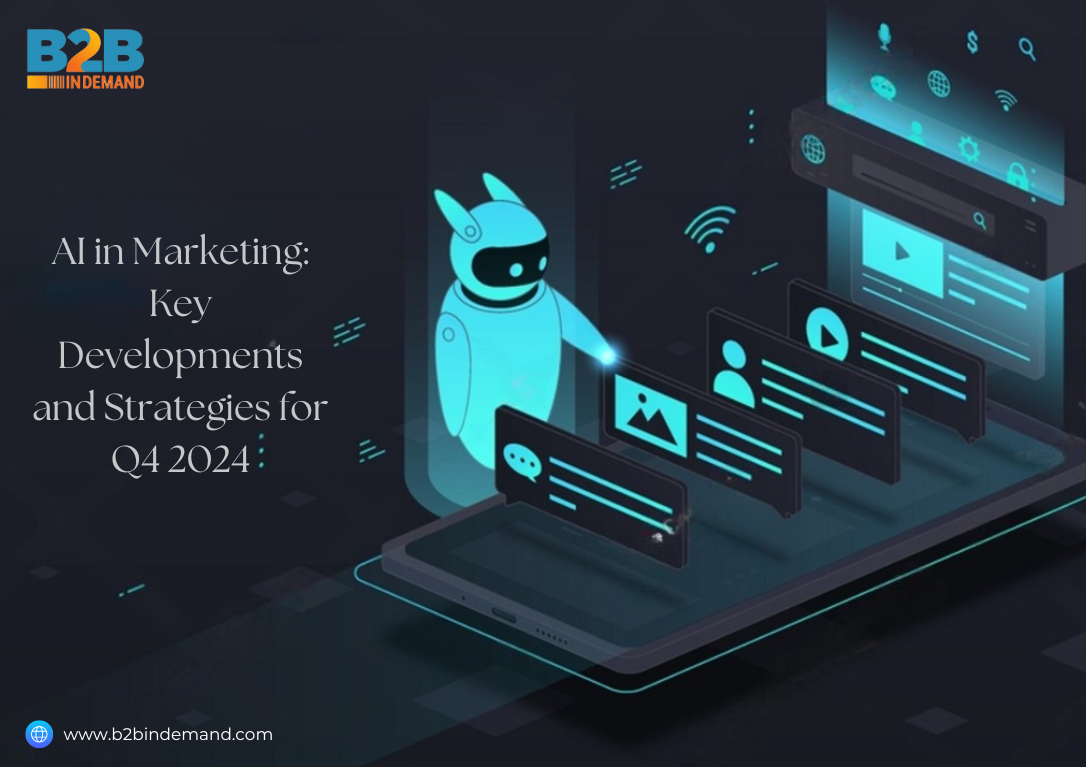
AI in Marketing
As we approach the end of 2024, AI in marketing has solidified its position as a critical component in driving business success. Companies worldwide have embraced AI technologies to enhance customer experiences, optimize marketing strategies, and harness data analytics. This article explores the latest developments in AI in marketing and highlights key strategies that businesses should consider as they prepare for the final quarter of the year.
1. Enhanced Personalization through AI
One of the most significant advancements in AI in marketing is the enhanced capability for personalization. Businesses are increasingly utilizing AI to tailor their content and offers to individual customer preferences. From advanced product recommendations to personalized email campaigns, AI systems analyze customer behavior to deliver relevant experiences.
Why It Matters
As we approach the end of 2024, consumers expect brands to anticipate their needs. AI-driven personalization is essential for building deeper customer relationships, boosting loyalty, and increasing conversion rates.
Key Tools
- Machine Learning Algorithms: Analyze customer behavior to predict future actions.
- Natural Language Processing (NLP): Enhances understanding of customer intent through text analysis, including social media interactions and chatbots.
2. AI in Content Creation and Curation
In Q4 2024, AI continues to revolutionize content creation and curation. Tools powered by Generative Pre-trained Transformers (GPT) have become invaluable for marketers, generating blog posts, social media content, and marketing emails that resonate with audiences.
The Rise of AI-Powered Content
More brands are leveraging AI to generate everything from catchy headlines to comprehensive articles. This allows marketers to focus on strategy and engagement rather than getting bogged down in the writing process.
Key Examples
Tools like Jasper.ai and Copy.ai have gained popularity for producing high-quality, engaging content quickly, positioning AI as a vital asset for content teams.
3. Predictive Analytics for Informed Decision-Making
As we near the year’s end, the role of predictive analytics in AI marketing is becoming increasingly prominent. Marketers can now leverage AI to analyze historical data, enabling them to forecast trends and customer behaviors more accurately.
Real-Time Adjustments
Predictive models allow marketers to make real-time adjustments to their campaigns. For example, if a campaign is underperforming, AI can suggest changes based on data analysis, ensuring that marketing efforts remain effective.
Key Tools
Platforms like Google AI tools and HubSpot AI are excellent examples of how predictive analytics can enhance decision-making in marketing.
4. Conversational AI and Chatbots
By the end of 2024, conversational AI and chatbots have matured significantly. These tools play a crucial role in customer service and marketing automation, providing real-time support and engagement.
The Marketing Role of Chatbots
Integrating chatbots into marketing funnels can enhance customer journeys by guiding users, answering questions, and offering personalized suggestions while collecting valuable data for future campaigns.
Popular Examples
ChatGPT for businesses and Drift are leading the charge, delivering intelligent, responsive interactions that enhance customer satisfaction.
5. AI-Driven Ad Targeting
As we approach Q4, AI in marketing has transformed how businesses approach advertising. AI-powered platforms are smarter, using behavioral data to deliver ads at optimal times and on the right platforms.
Programmatic Advertising
This technology automates the buying of ads, enabling brands to target specific audiences more efficiently. Continuous optimization of campaigns results in better performance and reduced costs.
Key Players
Google Ads and Meta’s AI-driven advertising platforms exemplify how AI enhances ad targeting and spend efficiency.
6. Marketing Automation Powered by AI
AI’s integration into marketing automation tools has become more profound in Q4 2024. These tools are designed to streamline processes across email marketing, social media scheduling, and lead nurturing, enabling businesses to create more personalized customer journeys.
Seamless Customer Experiences
AI tracks every customer interaction, allowing for the adjustment of email sequences and ad targeting based on real-time actions, aligning marketing efforts with customer expectations.
Key Examples
Salesforce’s AI-powered Pardot and ActiveCampaign are leading platforms utilizing AI to enhance marketing automation.
7. Addressing Ethical Concerns in AI Marketing
While AI in marketing offers many benefits, it also raises ethical concerns regarding data privacy, transparency, and decision-making processes. As consumers become more aware of how their data is utilized, marketers must prioritize ethical practices.
Data Privacy Compliance
As AI collects vast amounts of data, adherence to regulations like GDPR is essential. Businesses must handle customer data responsibly to build trust and credibility.
Conclusion
As we close out 2024, AI in marketing has transitioned from a novelty to a necessity. From personalized customer experiences and predictive analytics to content creation and automation, AI continues to reshape the marketing landscape. Marketers must stay proactive in adopting AI-driven strategies that enhance engagement, drive efficiency, and foster innovation. Embracing these technologies will enable businesses to deepen their connections with customers and stay ahead in an ever-evolving market.
